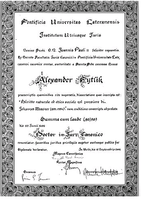

There are different study possibilities at universities in different states and therefore there will also be different requirements, depending on your choice of program.
If you want to apply to a German institution of higher education as a first-year student, a higher education entrance qualification will be required. This means that before being admitted to take a course of academic studies in your chosen discipline, you must prove that your school leaving certificate or secondary education qualification is equivalent to the German one.
Your qualification is evaluated according to the standards of the Ministry of Education and Cultural Affairs in the respective German federal state. Following the evaluation, your qualification may be considered equivalent or only conditionally comparable. You can check whether your qualification is equivalent or only comparable with the help of the tools provided on DAAD’s website or at www.anabin.de
If your qualification is only conditionally comparable, you will be required to pass an assessment test, the so-called Feststellungsprüfung. If you already are a student in your home country, in some cases, one or two successfully completed academic years will also be considered as proof of qualification. However, you should check this matter either with your home university’s International Office, or with the International Office of the chosen German university.
In case your qualification is considered equivalent to the German Abitur (the highest German school leaving certificate), you will only need to prove you are proficient in the German language. Accepted as proof are the following certificates: the Deutsche Sprachprüfung für den Hochschulzugang ausländischer Studienbewerber (DSH), the TestDaF, or the Sprachdiplom der Kultusministerkonferenz Stufe II, the Zentrale Oberstufenprüfung, the Großes Sprachdiplom or Kleines Sprachdiplom, awarded by the Goethe Institute.

Except for the DSH which has to be taken at the higher education institution itself, the other certificates can be gained either in your home country or in Germany. However, you may want to consider the possibility that the costs for these courses and exam may be lower in your country. For more information on courses, study material, and exam dates you can contact or visit the website of the Goethe Institute in your country. If there is no office in your country, find the nearest location at www.goethe.de . For the TestDaF you can check www.testdaf.de .
Tip: If you are a student, see whether your home university offers optional German courses for those who are not majoring or minoring in German. It would be a great opportunity you shouldn’t miss, since these courses are either free or require a very small fee. Another possibility would be private tutoring, which is great because it
focuses on your particular needs, but on the other hand is more expensive. However, you may want to think smart, and you could find yourself a tutor from among your colleagues majoring in German! It would be the perfect win-win situation for both of you: cheaper for you (you could also consider doing this together with another colleague and share the costs), and some extra pocket money for your tutor!
For graduate studies, i.e. a Master’s, Magister or Diplom degree, the recognition of your previous degree, the Bachelor’s degree respectively, is one of the decisive factors. You can check this matter first with the International Office of the desired university.

Another question here is the language certification. Depending on the language of instruction for the program you have chosen, which can be German or English, you would have to provide evidence recognized by the respective university. We have already discussed what these certificates are for German. As for English, you will usually be required to provide evidence of having passed the TOEFL exam. Check first with the International Office of the chosen university which passing score is required. You can find more information about the test, as well as preparatory material at www.toefl.org .
The matter of the recognition of previous qualifications is also decisive in looking for a doctoral program. Just like for the graduate studies, you should first contact the International Office of the chosen university to seek advice. Prospective doctoral students should first find a professor who will supervise their doctoral dissertation or thesis and contact him or her. You can then formally apply for admission. If you do not know which university offers doctoral programs in your field of interest, you can go to the following website which provides you with a search tool: www.higher-education-compass.de .
There are three cases in which you do not have to personally apply at a university or FH:
To apply for your desired program you can use either of the above mentioned ways. Whether you are applying for a summer school, for a scholarship, for a graduate or postgraduate program, you can find the application forms as downloads either on the website of the university or FH of your choice or at www.daad.de .
Some application forms can be sent electronically, others have to be printed out and mailed to the respective higher education institution. You should also bear in mind that in some federal states, like in Bavaria, the application forms that you will find here are not accepted. Please double-check this with the International Office of your chosen university of FH. Also, remember the application deadlines!
This article is an extract from Study in Germany - A comprehensive guide for foreign students. Click here to get a copy now.